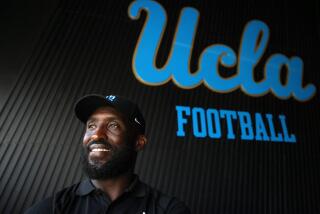The Baby Boomer Sooner
NORMAN, Okla. — The telephone rings, and a recorded voice at the other end of the line says this call is coming from a federal prison. Do you wish to accept?
Adrian Peterson, perhaps the best running back in college football, a 19-year-old prodigy at Oklahoma, knows it is his father calling.
“We talk once a week,” he says.
They usually discuss last Saturday’s game. Peterson asks for advice, and his dad, Nelson, is blunt.
“I critique him on his ballhandling, tell him to move the ball to the proper hand when he runs left,” Nelson says. “Pass blocking ... maybe he chips the linebacker when he should get a solid block.”
It is the sort of counsel one might expect from a father who has followed his boy’s career from the start.
Except that Nelson has been in a Texas prison for seven years, convicted of money laundering, so he must watch on television. The only relationship he and his son can have is by phone and occasional visits.
Some people say this unusual bond -- and the hardship it entails -- might help to explain why Peterson has become such an extraordinary athlete, that rare freshman who has a chance to win the Heisman Trophy on Saturday and help his team win a national championship, against USC in the Orange Bowl on Jan. 4.
Not the most talkative young man, at least not around reporters, Peterson says only that he depends on his father. As Nelson told him a long time ago: “Your daddy’s incarcerated, but that’s not going to stop me from being your daddy.”
In a telephone interview from the federal correctional institution in Texarkana, Texas, Nelson says he is not the least surprised by his son’s accomplishments this fall.
A highly touted recruit out of Palestine, Texas, Peterson broke into the Oklahoma lineup in the opener against Bowling Green, running for 100 yards and a touchdown.
It would be among his least-productive outings of the season.
His best performances have come in big games; he gained more than 200 yards in victories over Texas and Oklahoma State. In the Big 12 Championship game last weekend, he rushed for 172 yards and three touchdowns against Colorado.
“I have never seen a guy that big, that strong, that fast,” Colorado Coach Gary Barnett said of the 6-2, 210-pound teenager.
As a boy, Nelson says, Peterson showed several qualities that hinted at remarkable things to come.
It wasn’t just his preternatural speed. He had boundless energy, a trait that got him nicknamed “AD” because he could play all day. Also, he was quiet but fiercely competitive.
“I don’t care if you’re having a potato chip fight,” his father says. “He wants to eat more potato chips than you.”
But Peterson did not sail through life as so many talented young athletes do. In grade school, he saw his older brother, who was riding a bicycle, hit and killed by a drunk driver. Then, shortly before high school, his father was convicted of laundering money from a crack cocaine sale and sentenced to 10 years.
Peterson doesn’t talk much about that. His mother, Bonita Jackson, explains: “He went through a rebellious stage. I know all teenagers go through that, but it was really bad. A big part of his life was missing.”
Not even sports could provide a refuge. In ninth grade, a knee injury ended his football season after only a few games. Then his grades slipped, making him ineligible.
“We prayed a lot,” Bonita says. “And we talked. We told him things would get better.”
Although Bonita remarried to a minister, Frankie Jackson, she knew that her son needed his real father too. It helped that Nelson was sent to a prison that he describes as “very laid-back ... Martha Stewart would be here if she was a man.”
This allowed for regular calls and weekend visits. Working together, Nelson and the Jacksons remained patient but forceful with their son.
“I had to suck it up,” Peterson says. “Pull through.”
Eventually regaining his eligibility, he ran for 2,051 yards as a junior at Palestine High. The next season was even more impressive -- almost 3,000 yards and 32 touchdowns -- ranking him among the top prospects in the nation.
The first day that college coaches were allowed to visit recruits’ homes, Oklahoma Coach Bob Stoops showed up at the prison.
“I respect Coach Stoops a lot for that,” Nelson says. “Adrian was surprised.”
Stoops sensed in the recruit not only physical skill but an accumulation of experience that would help him manage big-time college sports.
“Mentally, he’s tough,” the coach says. “He’s at peace with who he is.”
This trait has been key to his success. Whereas most freshmen weaken about eight games into the season, Peterson has remained steady.
His background helps him “put some perspective on things,” offensive coordinator Chuck Long says. “He doesn’t get too emotional. He has an even-keeledness about him that most freshmen don’t.”
That’s not easy when you run onto the field in front of 84,000 screaming fans at Memorial Stadium. Peterson recalls: “My first game, I looked up at the crowd and it was overwhelming.”
It helps to have those chats with his father, he says. He mentions the chalk talk -- “He’ll tell me things I did wrong, things I can correct” -- but his mother sees something more important.
“His dad is not there in the physical [sense], and I think that bothers him,” she says. “But Nelson ... calling regularly ... that’s a big factor.”
So Peterson remains calm about his accomplishments. A glimpse of a smile, a hint of excitement, sneaks out at the thought of traveling to New York for the Heisman ceremony this weekend.
“I guess I’ve had a successful year,” he says. “It feels pretty good. All the hard work I’ve put out. It’s cool.”
Meanwhile, Nelson watches from afar. He has been lucky so far: All of Oklahoma’s games have been televised. Not that he feels lucky.
“It’s pretty tough on me,” Nelson says. “I would like to be there. I would like for Adrian to look in the stands and see his daddy there.”
He would like to be able to go to New York this weekend to see his son in the front row with the other finalists at the Heisman ceremony.
But Nelson says it doesn’t really matter if Peterson wins.
“ ‘You’re my Heisman,’ ” he told his son long ago. “ ‘You’re my everything.’ ”
*
(BEGIN TEXT OF INFOBOX)
Class by Themselves
With one game to play, Oklahoma running back Adrian Peterson needs 21 yards to pass Ron Dayne for the most rushing yards for an NCAA Division I-A freshman:
*--* Player, school Year Yds. 1. Ron Dayne, Wisconsin 1996 1,863 2. Adrian Peterson, Okla. 2004 1,843 3. Chance Kretschmer, Nev. 2001 1,732 4. Jamario Thomas, N. Texas 2004 1,709 5. Herschel Walker, Georgia 1980 1,616 6. Tony Dorsett, Pittsburgh 1973 1,586 7. Alex Smith, Indiana 1994 1,475 8. Anthony Davis, Wisconsin 2001 1,466 9. Marshall Faulk, SDSU 1991 1,429 10. Jamal Lewis, Tennessee 1997 1,364 11. Emmitt Smith, Florida 1987 1,341
*--*
More to Read
Go beyond the scoreboard
Get the latest on L.A.'s teams in the daily Sports Report newsletter.
You may occasionally receive promotional content from the Los Angeles Times.







